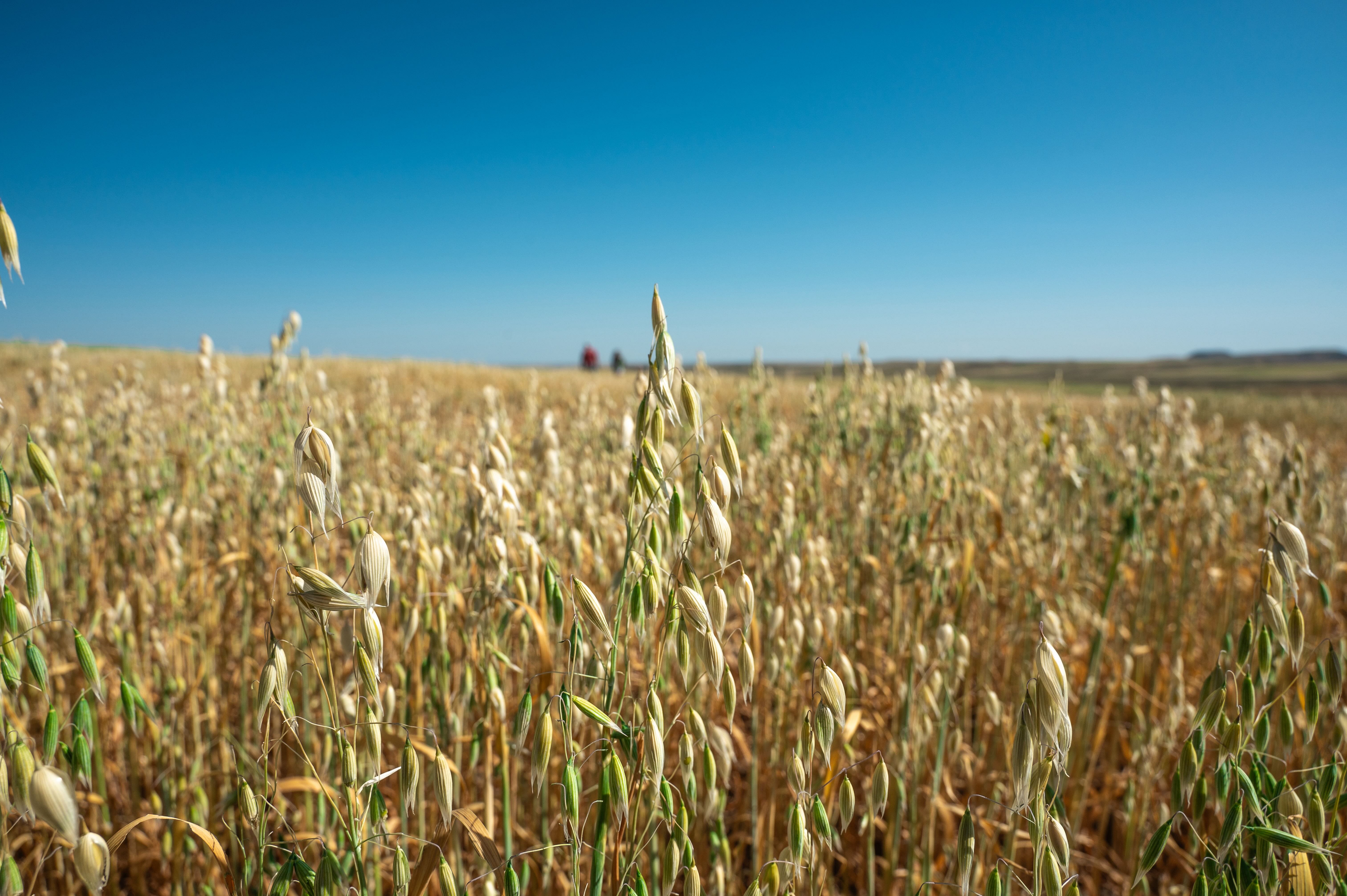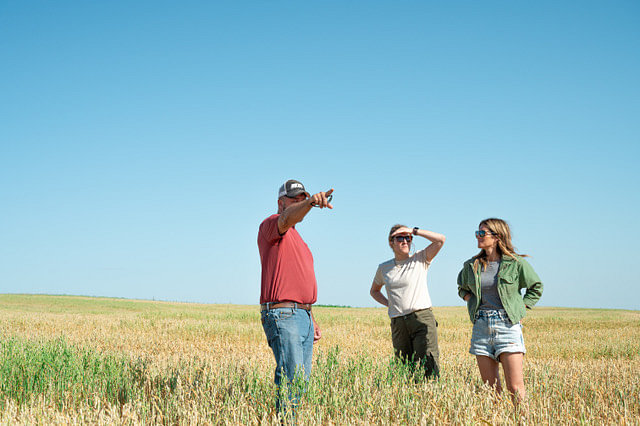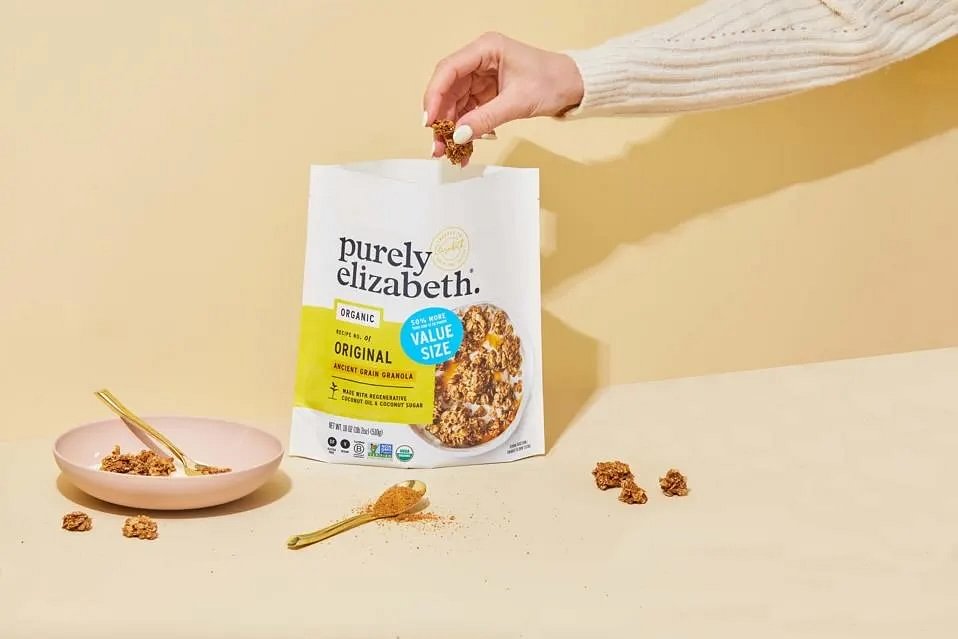
The CPG and Farmer Connection: A Love Story
Early this year, Mad Agriculture announced a pilot program designed to connect food companies with farms in order to help CPGs better understand and practically support on-farm regeneration. Driven by a concern that regenerative agriculture and the practices it deploys were being defined and prioritized in C-Suites and sourcing departments instead of on the farm, the Regenerative Impact Program starts with brand-to-farm sourcing contracts and then engages our on-farm research capacities to scientifically observe and explain the impacts of regenerative sourcing. But the program, as it turns out, ends up being much more than that….
Purely Elizabeth And Prairie Grass Ranch Step Up
Elizabeth Stein, founder and CEO of Purely Elizabeth, studied holistic nutrition and learned early on about the connection between healthy farms and healthy food. Her company’s commitment to regenerative agriculture is baked into the brand’s DNA. As part of their sustainability journey, Elizabeth recognized that she wanted to more deeply understand how regenerative practices impact the health and vitality of the farms from which they source ingredients.
“We want the data and the information to validate that these practices are doing what we’re saying and what we think they are doing.”
Jody and Crystal Manuel have the kind of picturesque farm you’d like to put on your product label. Prairie Grass Ranch is a Regenerative Organic Certified® (ROC™) fifth-generation farm in northern Montana, where the Manuels have raised six children along with oats, all kinds of legumes, alfalfa, and lots of animals including grass-fed cattle, goats, a donkey, and some family dogs. The duo manages their land with intention, in ecological balance with the hilly, arid Montana landscape that surrounds them. Crystal’s own wellness journey led to her mission to bring more nutrient-dense food to the world through regenerative farming.

Love At First Sight
Realizing that Prairie Grass Ranch's ROC™ oats would be a perfect fit for Purely Elizabeth’s sourcing program, connecting these folks really appealed to our matchmaking inclinations. As part of the Regenerative Impact Program, Mad Agriculture would assemble the supply chain partners and deal with contracts, cleaning, and quality specs. We’d conduct field-level and peer-reviewed research, nutrient density testing, and collaborate with on-farm storytelling and content development. We’d answer the questions that Purely Elizabeth has been asking, like:
- How nutritious are these oats?
- How healthy is the soil in which the oats are being planted?
- What kind of habitat is in and around these oat fields?
- What else are farmers planning on their land?
- How does planting oats contribute to a regenerative farm?
Introducing Elizabeth and her team to Jody and Crystal remains the highlight of the program so far. The mutual enthusiasm was immediate, with Elizabeth noting that the Manuels’ mission “exactly aligns with our core values and vision. Knowing that the health and diversity of our soil directly impacts the nutritional value of our foods, and in turn our gut and overall health, we could not be more excited to embark on this journey with Jody and Crystal.”
Time To Meet The Family
This summer, the Purely Elizabeth team headed out from their corporate headquarters in Boulder Colorado and made their way to the Manuel homestead in Havre Montana. They met the family, toured the farm, and had lunch at the Manuels’ kitchen table. Something remarkable happens when a brand steps onto a farm from which they are sourcing. It’s an experience that we don’t talk enough about: the human connection, and what can come from that. The first-hand observation of what one may or may not have already read about, and the deeper understanding and learning that flows from that. I recently sat down with Elizabeth, while sharing a mezcal margarita (up, with salt) in a downtown Boulder bar, and what she shared about their visit was both deeply personal and really affirming to hear.

Elizabeth hasn’t spent a lot of time standing in a field full of oats. During her visit to the Manuel’s farm, she witnessed the effects of the climate-induced Montana drought, and empathetically felt some of the worry that farmers live with every day. Elizabeth also saw the mitigation impacts of Jody’s regenerative practices, deepening her recognition of their importance in securing the future of her supply chain. Noting how many crops Jody grows to enhance his soil health, Elizabeth recognized the critical importance of product development to support crop diversity. Others on the team realized that they were looking at the farm through different lenses, and got to learn more about each other’s perspective: the procurement team thinks about short-term sourcing needs whereas Elizabeth is looking through the longer-term brand values and nutrition lens. Everyone appreciated that the farm visit would inform their consumer messaging and their business reporting.
From the Manuel’s perspective, the visit was both heartfelt and helpful. Farming can be a lonely enterprise, and it is rare when a broad-acre farmer actually knows where their crops show up in the marketplace. The usually taciturn Jody commented, “It’s nice to know that there are people at the other end that are excited about things being done in a different way.” Crystal added, “There is no better way for a brand to learn than coming to the farm.” And as it turns out, Elizabeth is providing the Manuels with experienced guidance for their new ancient grain grits product coming off the farm called Gruff (that just, by the way, won a Nexty at Expo East!).
The Proof Is In The Pudding
So here we are, 11 months into a three-year pilot, and there’s a heck of a lot of pudding. In addition to the 130 acres worth of ROC™ oats flowing into the Purely Elizabeth supply chain, with double that amount planned for next year, there is lots of learning for all of us. The first-year Regenerative Impact Report is being written and will be delivered to both Jody and Elizabeth before the end of the year. We look forward to revisiting the questions that have been on Elizabeth’s mind and will do our best to answer them.

There are two pages on the Purely Elizabeth website dedicated to education around regenerative agriculture and this program. I’m certain it further positions their brand as one authentically dedicated to people and planetary health in the hearts and minds of their customers. We can also tout a heck of a lot of media attention, which numbers about 20 media placements including articles in Forbes, Nosh, New Hope Network, and the Non-GMO Report, 242M unique monthly visitors to the Purely Elizabeth website, and a really fun discussion with Elizabeth on her wonderful podcast Living Purely that has been downloaded by 1,120 listeners.
There is no doubt that when we connect brands to farms and farms to brands it unlocks tremendous opportunities for storytelling - transforming consumers into regenerative warriors willing to use their grocery budgets to drive regeneration for themselves, their families, and our planet.
Ultimately, the true potential for regeneration lies within each one of us and in our relationship to each other. To realize the change we seek, we need to connect. We need to see and experience our shared values and vision. We need to learn about the challenges and obstacles the other faces and problem-solve together in a way that is equitable to both. And then we need to get to work. Together.
The biggest learning here doesn’t lie in the numbers: carbon sequestered, biodiversity accounted for, water quality and conservation noted, birds and bugs considered, and crops counted. All of these very important facts and figures, and their status over time does accurately represent the progress of regeneration on the farm. But it’s what we’re not measuring, it’s what we are not prioritizing, that is really the most critical and promising factor of all:
Bringing the folks behind the brands and their farmers together creates the potential for a love story that is the beginning of true regeneration for ourselves, for our food system, and for our planet.
I’m Elizabeth Candelario 👋, Director of Strategic Partnerships with Mad Agriculture. I’ve been working at the intersection of food, climate, and agriculture for the past 15 years, and I'm fired up that food companies are (finally!) paying attention to the farms growing their ingredients.
All images for this blog were shared with permission by Purely Elizabeth.
Editor's Note: The views expressed in this article are the author's alone and do not necessarily represent those of the ReGen Brands platform or team.
